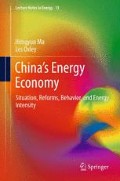Abstract
This chapter is organized as follows: Sect. 8.1 presents the estimated decompositions of energy intensity for firstly, the aggregate economy, followed by the industrial economy (Sect. 8.2). Section 8.3 compares the aggregate economy and industry economy results in order to uncover the differences driving energy intensity in practice. Section 8.4 provides further discussion of these results and what can be learnt from them by providing more empirical background information. The final Sect. 8.5 presents some implications and conclusions. The chapter uses methodologies presented in Chap. 4 and the data are described inChap. 5.
Access this chapter
Tax calculation will be finalised at checkout
Purchases are for personal use only
References
Bentzen J (2004) Estimating the rebound effect in US manufacturing energy consumption. Energ Econ 26:123–134
Chai Q, Zhang X (2010) Technologies and policies for the transition to a sustainable energy system in China. Energy 35:3995–4002
Gao Z, Wang Y (2007) The decomposition analysis of change of energy consumption for production in China. Stat Res 4:52–57 (in Chinese)
Greening LA, Greene DL, Difiglio C (2000) Energy efficiency and consumption: the rebound effect: a survey. Energ Policy 26:389–401
Joyashree R (2000) The rebound effect: some empirical evidence from India. Energ Policy 28:433–438
Kahrl F, Roland-Holst D (2008) Energy and exports in China. China Econ Rev 19:649–658
Li L, Zhou Y (2006) Can technological change improve technical efficiency? Evidence from China’s industry test. Manage World 10:82–89 (in Chinese)
Liao H, Fan Y, Wei Y (2007) What induced China’s energy intensity to fluctuate: 1997–2006? Energ Policy 35:4640–4649
Liu YY, Liu FC (2008) Rebound effect of energy consumption due to technological process: empirical analysis based on provincial panel data in China. Resour Sci 30(9):1300–1306 (in Chinese)
Ma C, Stern DI (2008) China’s changing energy intensity trend: a decomposition analysis. Energ Econ 30:1037–1053
Mizobuchi K (2008) An empirical study on the rebound effect considering capital costs. Energ Econ 30:2486–2516
Ouyang J, Long E, Hokao K (2010) Rebound effect in Chinese household energy efficiency and solution for mitigating it. Energy 35:5269–5276
Qi Z, Chen W (2006) Structural adjustment or technological change? Determinants of energy efficiency improvement of China after the reform. Shanghai Econ Stud 6:8–16 (in Chinese)
Reinhard H, Peter B (2000) The rebound effect for space heating: empirical evidence from Austria. Energy Policy 28:403–410
Shi Fu (2007c) Analysis of the dominant effect of China’s energy change-an empirical research based on the index decomposition model. J Shanxi Finance Econ Univ 29:24–28 (in Chinese)
Wang S, Yang J (2006) Long-run strategy and short-run measurement of China’s industrial energy adjustment- a cointegration analysis of energy demand for 12 main industries in China. China Soc Sci 4:88–96 (in Chinese)
Wang Q, Zhou D (2008) Improved model for evaluating rebound effect of energy resource and its empirical research. Chinese J Manage 5(5):688–691 (in Chinese)
Zhang R, Ding R (2007) An analysis on changing factor of Chinese energy intensity. China Mine Mag 16:31–34 (in Chinese)
Zhou Y, Li L (2006) The action of structure and Efficiency on Chinese energy intensity-an empirical analysis based on AWD. Ind Econ Study 4:68–74 (in Chinese)
Zhou Y, Lin YY (2007) The estimation of technological progress on the energy consumption returns effects. Economist 2:45–52 (in Chinese)
Author information
Authors and Affiliations
Corresponding author
Rights and permissions
Copyright information
© 2012 Springer-Verlag Berlin Heidelberg
About this chapter
Cite this chapter
Ma, H., Oxley, L. (2012). Technological Change and the Decomposition of Energy Intensity. In: China’s Energy Economy. Lecture Notes in Energy, vol 13. Springer, Berlin, Heidelberg. https://doi.org/10.1007/978-3-642-25887-9_8
Download citation
DOI: https://doi.org/10.1007/978-3-642-25887-9_8
Published:
Publisher Name: Springer, Berlin, Heidelberg
Print ISBN: 978-3-642-25886-2
Online ISBN: 978-3-642-25887-9
eBook Packages: EngineeringEngineering (R0)

